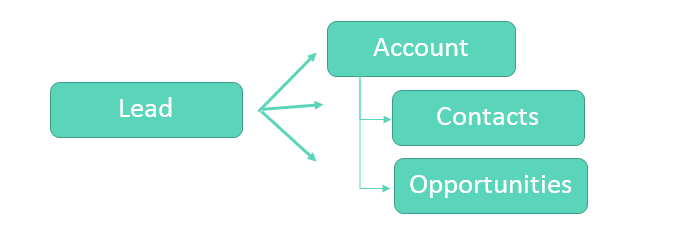Microsoft Dynamics 365 is designed to support the sales process from acquiring a new lead through the close of sales. Microsoft Dynamics 365 has a place to store the contact information for new leads, a place to track the follow-up communications, and the ability to qualify a Lead into an Account, Contact, and Opportunity.
Dynamics 365 keeps Leads in a separate area in order to ensure your main database of Accounts and Contacts does not get cluttered with people your organization doesn’t know.

What are accounts, contacts, leads, and opportunities for?
Account and contact records store much of the information that you and your team collect from your customers.
You store data about companies you do business within accounts. Similar to Microsoft Office Outlook or other email programs, you store data about the people you know and work within contacts.
Usually, an account has more than one contact associated with it, especially when you’re working with a larger company with many departments or locations and you deal with several people to manage the account.
Leads are for potential sales, and most organizations get leads from many sources. For example, you can enter leads manually from business cards, generate them from marketing campaigns or inquiries from your website, buy them in mailing lists, create them automatically from posts on Facebook or Twitter — the possibilities are almost endless.
If all goes well, after you nurture a lead, you’ll be able to promote it to an opportunity, which is another name for a deal you’re getting ready to close.
How Do Leads help Sales?
In Dynamics 365, the Leads area is designed as a “holding tank” for contacts and companies you don’t know or haven’t qualified yet. Like a firewall, it protects your database of Accounts and Contacts from becoming cluttered with the people you don’t know (i.e. the list you brought back from that tradeshow in 2009 and never completed the follow-up on).
This is a great feature if you have a large or unlimited market, and your strategy is to make a high volume of calls and contacts to find those golden opportunities. If you are constantly meeting new people and acquiring lists, the Lead record is very simple and it allows you to track Activities, nurture market, and capture the critical qualifying information needed to identify a sales opportunity. An individual contact stays in the Leads area until the user initiates a conversion process. Which is bringing the contact into your main database. The database keeps track of who is interested in buying or using a product, and also who isn’t.
Using the Leads area in Dynamics 365 you can also filter contacts and companies to find exactly what you’re looking for. For example a certain city or state. This is helpful if you just went to a convention or show in a certain city, and later need to contact those people.

What are cases?
You store all the data about customer issues or questions in a case. Cases can originate from phone calls, emails, inquiries on your website, or even from posts on Facebook or Twitter. (Some organizations call cases “incidents” or “tickets.”)
Cases store the details that service reps need to know as they resolve an issue. When you look at a case record, you’ll see the case priority, where it originated, whether the customer has other recent cases, how much service the customer is entitled to, and how much time you have to resolve it.
Microsoft Dynamics 365 is designed to support the sales process from the beginning of acquiring a new lead, through the close of a sale. Dynamic 365 for Sales is great for any business that has a client database or contacts they need to store. Contact us today to get started.



